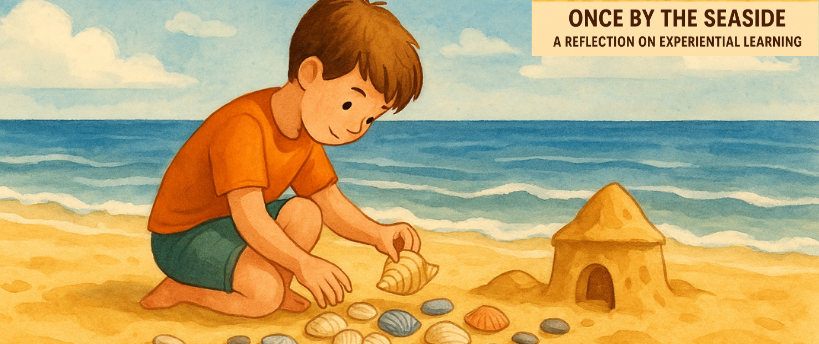

04
Nov 2025
During a visit to the seaside one afternoon, I observed a young boy deeply engaged in
gathering seashells along the shore. His parents stood a short distance away, quietly
watching him without interruption. What struck me most was the boy’s complete
absorption in his task — he was fully immersed in the process of exploration and
discovery.
Initially, he began by collecting seashells of various sizes, carefully sorting them into
small, medium, and large groups. After some time, he paused and reconsidered his
approach, realizing that he could also classify them by type, color, or texture. His
curiosity then extended beyond shells, as he began collecting small pebbles, comparing
their shapes and surfaces.
Soon, his exploration took a creative turn. He started building a small sand house and
gently placed his seashells inside, explaining that they needed a “shelter.” Encouraged
by his success, he attempted to build a larger structure to cover his legs, and eventually
one big enough to shelter his entire body. However, when the larger structure collapsed,
he made an important discovery — sand alone cannot support a large, stable form.
Undeterred, he decided to fetch some clay and experimented with mixing it into the
sand, testing whether the combination could make the structure stronger.
This simple yet profound moment was a true example of experiential learning in action.
The child was learning through curiosity, experimentation, and reflection — constructing
knowledge through direct experience rather than instruction. His parents played a silent
but significant role: they observed patiently, allowing him the space to explore, fail, and
try again without interference.
This experience made me reflect deeply on our approach to education. Why don’t we
offer children this kind of freedom more often — the freedom to learn through
exploration and experimentation? When we allow learners to make discoveries on their
own, we nurture critical thinking, problem-solving, creativity, and resilience.
As educators, our role is not merely to teach but to create conditions where meaningful
learning can emerge naturally. Learning through experience is not just effective — it is
transformative. It engages the heart, hands, and mind, making knowledge deeply
personal and lasting.
After all, learning by doing is truly learning for life.
 Leave a reply
Leave a reply
 Reviews (0)
Reviews (0)